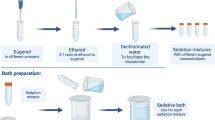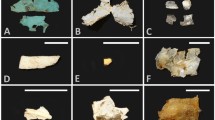Abstract
MARINE plants and animals required for identification or anatomical studies are usually preserved in a 70 per cent aqueous solution of ethyl alcohol or in a 2–4 per cent solution of formaldehyde (5–10 per cent formalin). The great disadvantages of ethyl alcohol are that it volatilizes very readily, it tends to produce precipitates from sea-water, and it causes shrinkage of many species. Although formalin evaporates less rapidly than ethyl alcohol, precautions to prevent desiccation are still necessary; it has the further disadvantage that it tends to oxidize to formic acid, which may dissolve calcareous structures, and it has a very strong smell.
This is a preview of subscription content, access via your institution
Access options
Subscribe to this journal
Receive 51 print issues and online access
$199.00 per year
only $3.90 per issue
Buy this article
- Purchase on Springer Link
- Instant access to full article PDF
Prices may be subject to local taxes which are calculated during checkout
Similar content being viewed by others
Author information
Authors and Affiliations
Rights and permissions
About this article
Cite this article
WILLIAMSON, D., RUSSELL, G. Ethylene Glycol as a Preservative for Marine Organisms. Nature 206, 1370–1371 (1965). https://doi.org/10.1038/2061370a0
Issue Date:
DOI: https://doi.org/10.1038/2061370a0
Comments
By submitting a comment you agree to abide by our Terms and Community Guidelines. If you find something abusive or that does not comply with our terms or guidelines please flag it as inappropriate.



